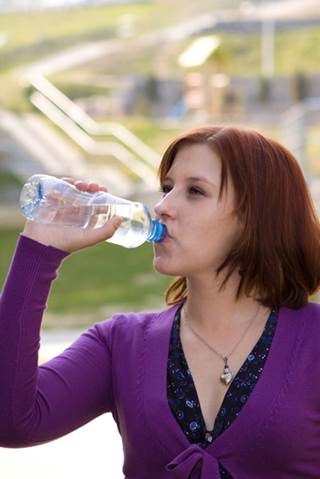
Dialysis patients who gain too much fluid between treatments should be advised to drink less.
Although adequate fluid intake is an essential requirement for survival, excessive fluid intake can increase morbidity and mortality in stage 5 CKD patients, according to a recent study by Kalantar-Zadeh and colleagues (Circulation. 2009;119:671-679).
The authors examined average interdialytic fluid gains of 34,107 maintenance hemodialysis (MHD) patients over a two-year period to determine the effect of higher fluid volumes on cardiovascular outcomes.
Study results indicate that fluid gains greater than 1.5 kg between dialysis treatments were common in 86% of patients examined and were associated with an increased risk of all-cause and cardiovascular death after controlling for age, gender, diabetes, dialysis vintage, and markers of protein intake and nutritional status.
The authors note that using interdialytic fluid gains of 1.5-2 kg as a reference range, a weight gain of 4.0 kg or more over two consecutive dialysis sessions was associated with a 28% increased death risk, whereas minimal fluid retention (between 0.5 and 1.0 kg) was associated with a 26% reduced death risk.
The National Kidney Foundation (NKF) Kidney Disease Outcomes Quality Initiatives (KDOQI) Clinical Practice Guidelines for Hemodialysis Adequacy also recognize the importance of fluid volume control in dialysis patients. In “Guideline 5. Control of Volume and Blood Pressure,” the KDOQI notes that “poor volume control can exacerbate hypertension and its myriad detrimental effects on the cardiovascular system.”
In agreement with results of the Kalantar-Zadeh study, the guidelines report that “analysis of [U.S. Renal Data System] Waves 3 and 4, when adjusted for comorbidity, showed that weight gain between dialyses of more than 4.8% (i.e., 3.4 kg in a 70-kg person), a reflection of excessive sodium and water intake, is associated with increased mortality.” The guidelines emphasize the importance of limiting sodium intake to 2 g daily to decrease thirst and facilitate adherence when fluid restrictions are required.
Fluid recommendations for MHD patients are determined by urine volume, with daily fluid intake limited to output plus 1,000 cc in order to prevent interdialytic gains greater than 4% of body weight, according to the fourth edition of the Pocket Guide to Nutrition Assessment of the Patient with Chronic Kidney Disease 2009 put out by the NKF Council on Renal Nutrition.
Fluids include all beverages, foods that melt (ice, popsicles, ice cream, gelatin), and soup. Although it is interesting to note that almost all foods contain some fluid (meat is approximately 50% fluid, while the fruits/vegetables are approximately 90% fluid) and contribute an estimated 800-1,000 cc of fluid daily, this amount is offset by insensible fluid losses estimated at 1,000 cc/day through evaporation (skin, respiration) and stool.
Because adequate nutrition is key to improved health outcomes, dialysis patients who gain too much fluid between treatments should never be advised to eat less, but rather to drink less. Strategies to assist patients in decreasing fluid intake include:
- Avoiding salt and salty foods
- Maintaining blood sugar control (for people with diabetes)
- Using mouth sprays or mouthwash to relieve dryness
- Chewing gum
- Sucking on a lemon wedge or sour hard candy
- Freezing allowed fruit (e.g., grapes)
- Consuming ice (in measured amounts), popsicles
- Using a measuring cup to check the volume of household cups and glasses
- Keeping a fluid intake chart
- Filling a water pitcher with daily fluid allowance (and discarding amounts equal to other beverages consumed during the day to keep track of fluid intake)
- Using smaller cups/glasses
- Drinking from thirst rather than from habit.
Having been encouraged to drink more in earlier stages of CKD, patients new to dialysis often report difficulty adjusting to fluid restrictions. Although fluid intake is usually unlimited in predialysis patients, Wenzel and colleagues (Clin J Am Soc Nephrol. 2006;1:344-346) suggest that patients not be advised to increase fluid intake above normal requirements except in certain conditions (i.e., urolithiasis, salt-wasting nephropathy, diabetes insipidus).
The authors outline common misconceptions regarding recommendations to “push fluids” in CKD patients, stating that there is no evidence of benefit and that excessive fluid intake may even cause harm by promoting disease progression. Citing a retrospective analysis of the Modification of Diet in Renal Disease Study, the authors note that “patients with a high daily fluid intake (urine volume 2.4 L/day) have an accelerated loss of kidney function compared with patients with a lower fluid intake (1.4 L/day)” and that “this loss of kidney function was independent of other risk factors.” Though not suggesting any benefit to fluid restriction in early stages of CKD, the authors recommend that patients be advised to let thirst dictate fluid intake. -renalandurologynews.com
No comments:
Post a Comment